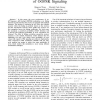Free Online Productivity Tools
i2Speak
i2Symbol
i2OCR
iTex2Img
iWeb2Print
iWeb2Shot
i2Type
iPdf2Split
iPdf2Merge
i2Bopomofo
i2Arabic
i2Style
i2Image
i2PDF
iLatex2Rtf
Sci2ools
CORR
2007
Springer
2007
Springer
Performance Analysis for Multichannel Reception of OOFSK Signaling
— 1 In this paper, the error performance of onoff frequency shift keying (OOFSK) modulation over fading channels is analyzed when the receiver is equipped with multiple antennas. The analysis is conducted in two cases: the coherent scenario where the fading is perfectly known at the receiver, and the noncoherent scenario where neither the receiver nor the transmitter knows the fading coefficients. For both cases, the maximum a posteriori probability (MAP) detection rule is derived and analytical probability of error expressions are obtained. The effect of fading correlation among the receiver antennas is also studied. Simulation results indicate that for sufficiently low duty cycle values, lower probability of error values with respect to FSK signaling are achieved. Equivalently, when compared to FSK modulation, OOFSK with low duty cycle requires less energy to achieve the same probability of error, which renders this modulation a more energy efficient transmission technique.
| Added | 13 Dec 2010 |
| Updated | 13 Dec 2010 |
| Type | Journal |
| Year | 2007 |
| Where | CORR |
| Authors | Qingyun Wang, Mustafa Cenk Gursoy |
Comments (0)

